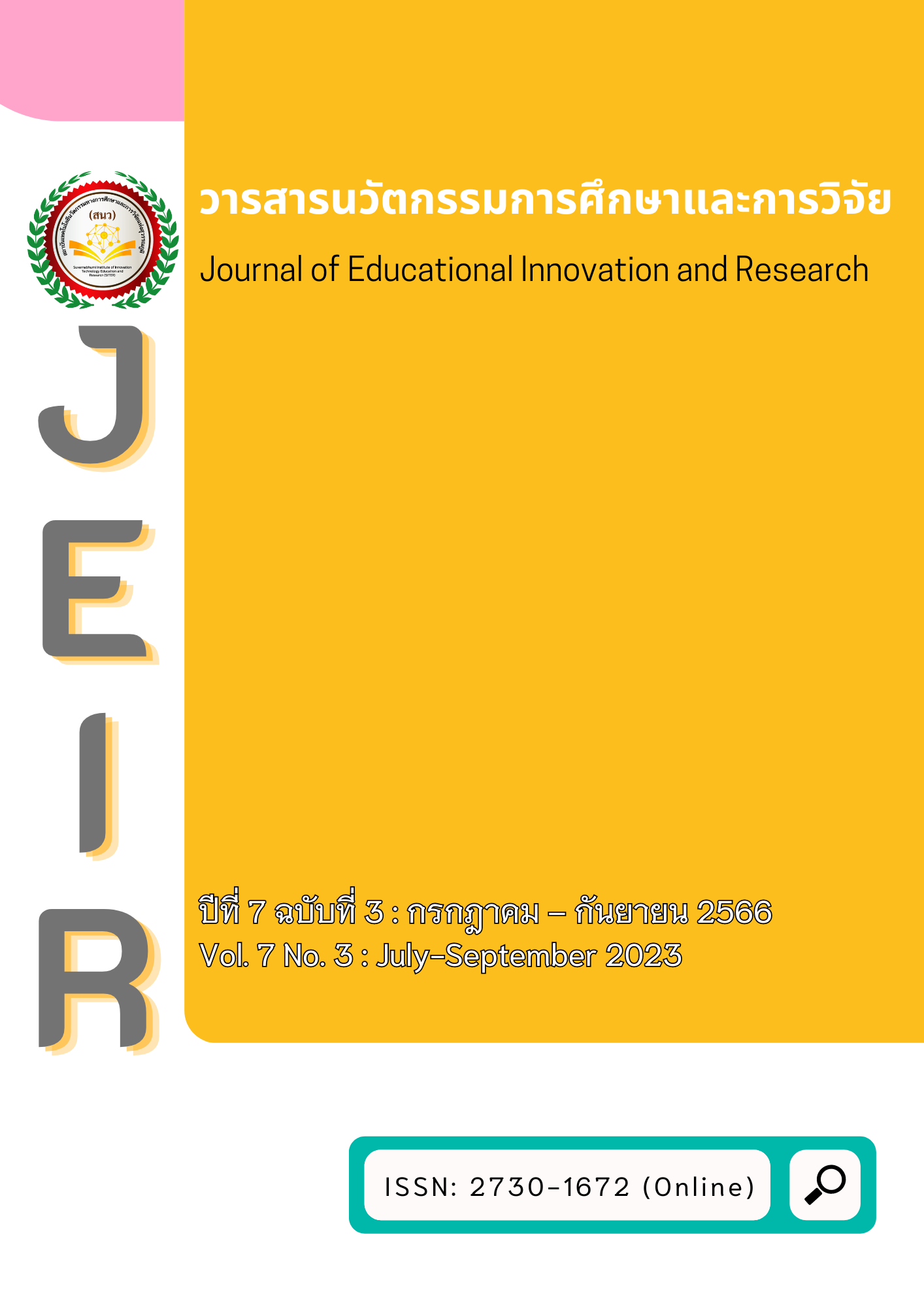Meta-Analysis of STEM Education Influencing Learning Achievement and Thinking in Thailand from 2016 to 2020
Main Article Content
บทคัดย่อ
STEM education is one of the alternative learning approaches, and it is promoted widely in Thailand since it integrates four core subjects: science, technology, engineering, and mathematics for students to learn at once. Further, implementing STEM education might enhance students' soft skills along with hard skills. Therefore, this study aims to identify the effect-size index of STEM education influencing 1) students' learning achievement and 2) thinking skills. This study's population comprises 104 master's and doctoral theses on STEM education in Thailand. The following criteria were applied to select samples: it should be a master's or doctoral thesis on STEM education conducted in Thailand, the research design is a two-group pretest-posttest design, and it has been published on the Thai Digital Collection database between 2016-2020. Data were collected from eight theses according to the criteria mentioned above using the research evaluation form and research record form. Meta-analysis is employed in this study. The finding reveals that STEM education enhances students' learning achievement of experiment groups compared to control groups' (SMD=0.906 (95%CI;0.706 to 1.105), I2=49.800). STEM education also enhances students' thinking skills of experiment groups compared to control groups' (SMD=0.993 (95%CI;0.745 to 1.242), I2=0.000). The results show that STEM education helps students to level up their learning achievement and thinking skills.
Article Details

อนุญาตภายใต้เงื่อนไข Creative Commons Attribution-NonCommercial-NoDerivatives 4.0 International License.
เอกสารอ้างอิง
Apaivatin, A., Srikoon, S. & Mungngam, P. (2021). Research synthesis of STEM Education effected on science process skills in Thailand. Journal of Physics: Conference Series, 1835(012087), 1-10.
Chakphet Suriyakamol. (2016). The Effects of STEM Integration Based Extra-Curricular Activities on Literacy and Collaborative Problem Solving Behavior for Prathomsueksa Six Students. (Doctoral Dissertation). Srinakharinwirot University.
Chavarangpong, S. (2018). Comparison of 21st Century Skills and Learning Achiement of Grade 3 Student on the Topic "Materials Around Us" Using STEM Education Approach and Tradition Instruction (Doctoral Dissertation). Thepsatri Rajabhat University.
DerSimonian, R. & Laird, N. (1986). Meta-analysis in clinical trials. Control Clin Trials, 7, 177–188.
Khamngoen, S. & Srikoon, S. (2021). Research synthesis of STEM Education approach effected on students' problem-solving skills in Thailand. Journal of Physics: Conferences, 1835 (012086), 1-8.
Khamput, S., Srikoon, S., & Bamroongkit, S. (2021). The Research Synthesis of STEM Education in Thailand. Journal of Buddhist Studies, 12(1), 187-204.
Khwana, T & Khwana, K. (2021). STEM Education for Learning Management to Work Skills in the 21st Century. Journal of Graduate School Sakon Nakhon Rajabhat University, 16(73), 1-12.
Manujum, P. (2017). The Study on Reflective Thinking using Problem-Based Learning with STEM Education Concept (Doctoral Dissertation). Ubon Ratchathani University.
Monsang, P. & Srikoon, S. (2021). Meta-Analysis of STEM Education Approach effected on Student' Creative thinking skills in Thailand. Journal of Physics: Conferences, 1835(012085), 1-8.
Onthida Swang. (2017). The Study on Mathematical Creative Thinking in Originality Aspect Using Problem-Based Learning with Stem Education Concept (Doctoral Dissertation). Ubon Ratchathani University.
Palmer, T.M., Sterne, J.A.C., Newton, H.J., and Cox, N.J. (2016). Meta-Analysis in Stata: An Updated Collection from the Stata Journal. (2nd ed.). United States of America: Stata Press.
Phuripong Tongkhang. (2017). The Development of an Online Integration Learning Model Based on STEM Education to Enhance Critical Thinking Ability of High School Student (Doctoral Dissertation). Rajabhat Maha Sarakham University.
Polyiem, T. (2018). STEM Education: Introduction to Integrated Classroom. Journal of Faculty of Education Pibulsongkram Rajabhat University, 5(2), 122-135.
Prapasee, W. (2017). The Study on Mathematics Analytical Thinking using Problem-Based Learning with STEM Education Concept (Doctoral Dissertation). Ubon Ratchathani University.
Ranmeechai, P. (2017). Comparison of Learning Activities in Cording to the Guidelines of the STEM Education on Electrochemistry Issue of Secondary student at the 11th Grade Level. (Doctoral Dissertation). Maha Sarakham University.
Srikoon, S. (2019). Meta-Analysis of Teaching Model based-on Educational Neuroscience influencing on Science Learning Outcomes in Thailand. Journal of Graduate Studies Review Mahachulalongkornrajavidyalaya University, Phare Campus, 5(2), 127-146.
Srikoon, S., Apaivatin, R., Monsang, P., Khamngoen, S., & Malaitao, T. (2020). Construct validity of Assessing Interest in STEM Content Scale. Education Research International, 2020(1), 1-7.
Srikoon, S., Bunterm, T., Samranjai, J., & Wattanathorn. (2014). Research Synthesis of Research Based Learning for Education in Thailand. Procedia Social and Behavioral Sciences, 116(1), 913-917.
Srikoon, S., Punsrigate Khongjaroen, K., Apaiyatin, R., Apaikawee, D., & Khamput, C. (2021). A Study of Influences of the Research Ethic Affecting the Attitudes towards STEM Education. Journal of Social Academic, 14(1), 70-80.
Thitipong, L. & Srikoon, S. (2021). Meta-analysis of STEM Education approach effected on students' learning achievement in Thailand. Journal of Physics: Conferences, 1835(012084), 1-7.
Wiratchai, N. & Jetchamnongnuch, W. (2008). Meta-Evaluation and Meta-Analysis of External Quality Evaluation Reports, Higher Education Level. Journal of Research Methodology, 21(2), 125-145.


